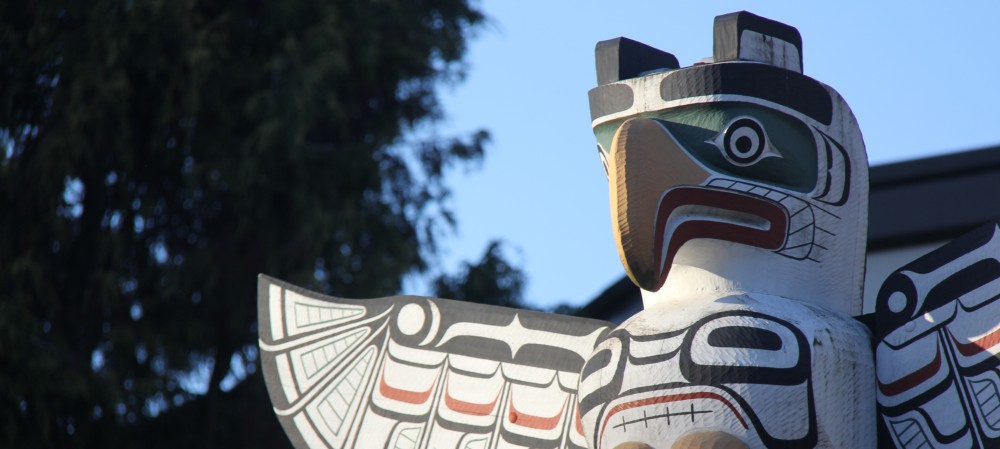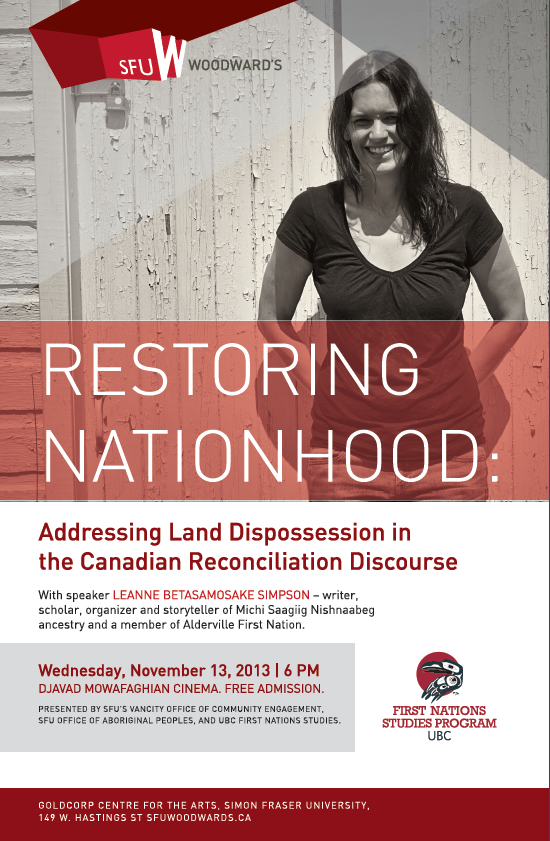Author Archives: ammckenz
Welcome Back
Dear Students, Teachers and Friends,
Welcome to a new year and a new start to the First Nation Studies Undergraduate Blog. Already a fall chill is upon us and assignments are due! We would like to extend a welcome to and a welcome back to our blog, which acts as a space for First Nation Studies students and other related fields to post their work in a safe and open space. This blog is the informal partner to the Indigenous Studies Undergraduate Journal and allows for a variety of work to be contributed. We also like to stay connected to the UBC and greater Vancouver area community through our events page. This September, there has been a surplus of events surrounding the arrival of the Truth and Reconciliation Commission. As many of you know, all undergraduate classes at the University of British Columbia were cancelled in order for students to participate in the opening of the TRC at the PNE. Within many of our First Nation Studies courses, the theme of “reconciliation” has been very prevalent. We encourage an ongoing dialogue around the theme of reconciliation as an on-going process.
If you are interested in submitting a piece, email us at isujblogeditors@gmail.com
Untitled Poem by Anna McKenzie
Sometimes in the midst of my day to day life, I am overcome with a sadness when I see one of my brothers or sisters struggling with the life they have inherited as an Indigenous person. I wrote this piece on my phone while I was on the bus, watching an Indigenous brother struggle with alcohol. I observed the looks he received by other riders on the bus, of pity and disgust. I listened helplessly as the bus driver asked him to get off the bus, and the shame he felt. I felt my own shame for not being able to stand up for him in that moment, to explain to everyone what led this man to this place of darkness. Instead, I wrote a poem.
He could have been a warrior
He could have been a leader
He could have been a provider
A protector of his people
Instead he sits on corners
Displaced from his land and spirit
His identity was stolen
From those who sought to possess it
She could have been a warrior
She could have been a leader
She could have had a voice
To be valued by her people
Instead she talks to no one
And struggles in her silence
Her voice and power were stolen
By those who sought to possess it
My Kokum Tells Stories by Samantha Nock
The inspiration for this piece came from reading Linda Tuhiwai Smith’s Decolonizing Methodologies, in which she discusses the value of listening to a person’s story as a legitimate living archive. It made me think of my little old kokum, sitting at her kitchen table up in Fort St. John, BC, who loves nothing more than to tell stories, because that’s what she does:
My kokum, she tells stories, she gossips… on the phone, in the bingo hall, at the friendship centre, at the Metis office, or at her kitchen table. She is always talking, talkin’ about other people, talking about the old times, talking about the times she wants to live to see.
When I was younger, I always laughed about this, because she’s always talking about “that one time” or “Johnny (my mosom) remember when…” or “Mum used to…” or “When we were kids…” or “The nuns…”. I used to pass these stories off as my kokum just talkin’ to talk about something… but the more I realize it, she was doing something that is inherently Metis.
She’s telling stories, she’s talking about people and places of our past, our culture, stories of how she used to collect medicines with her dad up in Sakitawak, and which medicines were good for tea when you had a cold, about the spirits who talked to her at Lac Ste. Anne, or how the nuns were cruel to her when she spoke Cree in residential school. My kokum’s lived experiences are an integral part of my life, entwined through her stories are parts of our shared history. This is a history I can’t find written on archived pieces of paper, where my ancestor’s first name is “Scrip”, last name “Holder”. Hidden within my kokum’s stories are histories deeper than HBC trade logs and country wives; her words are our history from our community. All these stories she tells us, every time she is gossiping about something that happened, these are all things that connect her to her daughters, her daughters to their children, me to her and my mother to me. The laughing, the gossiping, the story telling at my kokum’s kitchen table while we drink cheap black coffee… that’s decolonization.
I am a casualty by Crystal Smith de Molina
I dive into the ocean
Submerging myself in beauty
The soft bed rocks beneath me
The sweet sound of songs
From whales near by
The scuttling of king crab
And chatter of school fish
I dove into Beauty…
As I opened my eyes
I saw nothing
And felt everything
I was choking
I rose from the water; which was supposed to embrace my body
Yet it entangled me
And I could not break free
I was covered in thick darkness
My whole body felt ill
The slick oil slithered down my throat
Into my lungs it crept
Every branch of air engulfed in dirty oil
My heart pumping
My heart slowing as oil reaches it
My blood flowing
My blood weighed down and blocked by oil
I am dying
My body is filled with oil
They try and save me
Cleaning my outer limbs
But how will they clean my heart
Which weeps black tears
How will I breathe?
When oil has contaminated my lungs
I am nothing
But a casualty of blind greed
Collateral damage
Money before life
Oil before water
Country “benefits” before citizens
Growth before stability
I am dead
But at least they tried to save me?
Crystal Smith de Molina is from the Tsimshian and Haisla Nation and has been a resident of Vancouver for ten years. She is married and has two wonderful children. Crystal is a full-time student at the University of British Columbia in NITEP (Native Indian Teacher Bachelor of Education Program).
Welcome from the Blog Editors
Hello and welcome to the newly created Indigenous Studies Undergraduate Blog! We are excited to present a space where work can be shared and discussed on a continuous basis within the First Nation Studies Program and the University of British Columbia. Our vision is to have an ongoing conversation through the sharing of voices and the creation of new knowledge in a contemporary space. We encourage undergraduate students in the First Nations Studies program or related fields to share your work with us and with this newly created community. We also encourage friends and allies to share their thoughts and opinions, and for everyone to gain a greater understanding on historical and contemporary First Nations topics, and events. We look forward to hearing your voices.
The Blog Editors


 Follow
Follow